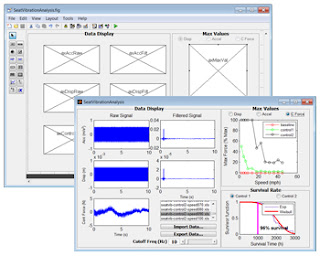 Introduction
Introduction
MATLAB® is a high-level technical computing language and interactive environment for algorithm development, data visualization, data analysis, and numerical computation. Using MATLAB, you can solve technical computing problems faster than with traditional programming languages, such as C, C++, and Fortran.
You can use MATLAB in a wide range of applications, including signal and image processing, communications, control design, test and measurement, financial modeling and analysis, and computational biology. Add-on toolboxes (collections of special-purpose MATLAB functions) extend the MATLAB environment to solve particular classes of problems in these application areas.
MATLAB provides a number of features for documenting and sharing your work. You can integrate your MATLAB code with other languages and applications, and distribute your MATLAB algorithms and applications.
Key Features
- High-level language for technical computing
- Development environment for managing code, files, and data
- Interactive tools for iterative exploration, design, and problem solving
- Mathematical functions for linear algebra, statistics, Fourier analysis, filtering, optimization, and numerical integration
- 2-D and 3-D graphics functions for visualizing data
- Tools for building custom graphical user interfaces
- Functions for integrating MATLAB based algorithms with external applications and languages, such as C, C++, Fortran, Java, COM, and Microsoft Excel
Developing Algorithms and Applications
MATLAB provides a high-level language and development tools that let you quickly develop and analyze your algorithms and applications.
Developing Algorithms and Applications
MATLAB provides a high-level language and development tools that let you quickly develop and analyze your algorithms and applications.
Developing Algorithms and Applications
MATLAB provides a high-level language and development tools that let you quickly develop and analyze your algorithms and applications.
The MATLAB Language
The MATLAB language supports the vector and matrix operations that are fundamental to engineering and scientific problems. It enables fast development and execution.
With the MATLAB language, you can program and develop algorithms faster than with traditional languages because you do not need to perform low-level administrative tasks, such as declaring variables, specifying data types, and allocating memory. In many cases, MATLAB eliminates the need for ‘for’ loops. As a result, one line of MATLAB code can often replace several lines of C or C++ code.
At the same time, MATLAB provides all the features of a traditional programming language, including arithmetic operators, flow control, data structures, data types, object-oriented programming (OOP), and debugging features.
The MATLAB Language
The MATLAB language supports the vector and matrix operations that are fundamental to engineering and scientific problems. It enables fast development and execution.
With the MATLAB language, you can program and develop algorithms faster than with traditional languages because you do not need to perform low-level administrative tasks, such as declaring variables, specifying data types, and allocating memory. In many cases, MATLAB eliminates the need for ‘for’ loops. As a result, one line of MATLAB code can often replace several lines of C or C++ code.
At the same time, MATLAB provides all the features of a traditional programming language, including arithmetic operators, flow control, data structures, data types, object-oriented programming (OOP), and debugging features.
The MATLAB Language
The MATLAB language supports the vector and matrix operations that are fundamental to engineering and scientific problems. It enables fast development and execution.
With the MATLAB language, you can program and develop algorithms faster than with traditional languages because you do not need to perform low-level administrative tasks, such as declaring variables, specifying data types, and allocating memory. In many cases, MATLAB eliminates the need for ‘for’ loops. As a result, one line of MATLAB code can often replace several lines of C or C++ code.
At the same time, MATLAB provides all the features of a traditional programming language, including arithmetic operators, flow control, data structures, data types, object-oriented programming (OOP), and debugging features.MATLAB lets you execute commands or groups of commands one at a time, without compiling and linking, enabling you to quickly iterate to the optimal solution.
For fast execution of heavy matrix and vector computations, MATLAB uses processor-optimized libraries. For general-purpose scalar computations, MATLAB generates machine-code instructions using its JIT (Just-In-Time) compilation technology.
 This technology, which is available on most platforms, provides execution speeds that rival those of traditional programming languages.
This technology, which is available on most platforms, provides execution speeds that rival those of traditional programming languages.Development Tools
MATLAB includes development tools that help you implement your algorithm efficiently. These include the following:
MATLAB Editor - Provides standard editing and debugging features, such as setting breakpoints and single stepping
Code Analyzer - Checks your code for problems and recommends modifications to maximize performance and maintainability
MATLAB Profiler - Records the time spent executing each line of code
Directory Reports - Scan all the files in a directory and report on code efficiency, file differences, file dependencies, and code coverage

No comments:
Post a Comment